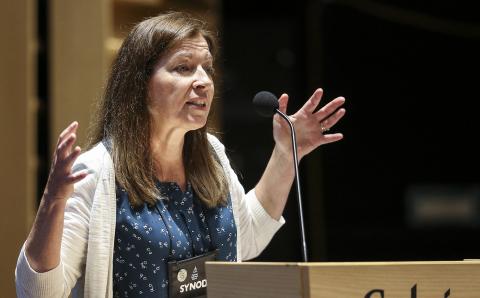Some readers think my warning against loveless orthodoxy in my last editorial (“Beware Loveless Orthodoxy,” July/Aug 2022) was aimed at synod’s decision to declare the interpretation that “unchastity” in the Heidelberg Catechism includes homosexual acts, among other unchaste acts, as confessional. To be clear, I was calling out “a spirit of censure and distrust” as loveless orthodoxy, not the decision itself. As I often do, I was focusing on “how” rather than “what,” because “how” matters (“‘How’ Matters,” February 2020). I find it telling that some would confuse that spirit of censure with the synodical decision.
I witnessed that spirit of censure and distrust during debates on the floor of synod. For instance, a delegate jumped up to propose disciplinary action on another delegate even while that person was still speaking. Or consider when delegates argued over a normally routine approval of the next synod’s host church, not because Church of the Servant had done anything wrong but because it was in Classis Grand Rapids East.
It’s not only during synod. It’s a pervasive spirit around synod and the denomination as a whole. It is seeing the denomination as locked into a life-and-death battle. As one CRC pastor put it in a podcast, it’s a “big fight” with “a lot of blood on the ground.” Another pastor, in a post-synod video, spoke of “tremendous rot” in our denominational agencies and institutions that “needs to be cleaned out.” I didn’t want to call out these examples in my previous editorial, but it seems I need to for clarity.
It was not the only spirit that I witnessed at synod. As I mentioned in my previous editorial, I also witnessed “apologies and forgiveness.” But I focused on the loveless orthodoxy of this spirit of censure because I think it is dangerous, as it deludes us into thinking we are on track to spiritual revival when it actually takes us further from revival.
The zeal for orthodoxy (correct beliefs) can lull us into thinking we can pat ourselves on the back for obeying God and loving God’s truths. Loveless orthodoxy feeds into our spiritual pride. As I have written previously, “a spirit of fault-finding is a sure symptom of spiritual pride” (“Revival and Spiritual Pride” June 2021).
I wrote then, “The spiritually proud are often harsh in their criticisms of others, even of other Christians. (Jonathan) Edwards bemoaned how they often would cloak their prideful harshness in sanctity and bold zeal for Christ to call things out. Rather, humble Christians, said Edwards, should ‘treat one another with as much humility and gentleness as Christ, who is infinitely above them, treats them’ (Works, Vol. 1, ix.v.i).”
I have been praying for the spiritual revival of the CRC. Yes, wanton disobedience to God’s truth will lead us astray—that’s obvious. But I call out the less obvious and also our seemingly common collective default posture: spiritual pride in fault-finding, even especially intellectual, theological fault-finding. There can be no spiritual revival without genuine humility. Once again, seeking to have a right heart (“Orthocardia” June 2022) gets buried under a hyper-focus on orthodoxy and orthopraxy.
Few seem to have heeded all my previous warnings.
About the Author
Shiao Chong is editor-in-chief of The Banner. He attends Fellowship Christian Reformed Church in Toronto, Ont.
Shiao Chong es el redactor jefe de The Banner. El asiste a Iglesia Comunidad Cristiana Reformada en Toronto, Ont.
시아오 총은 더 배너 (The Banner)의 편집장이다. 온타리오 주 토론토의 펠로우쉽 CRC에 출석한다.
You can follow him @shiaochong (Twitter) and @3dchristianity (Facebook).








